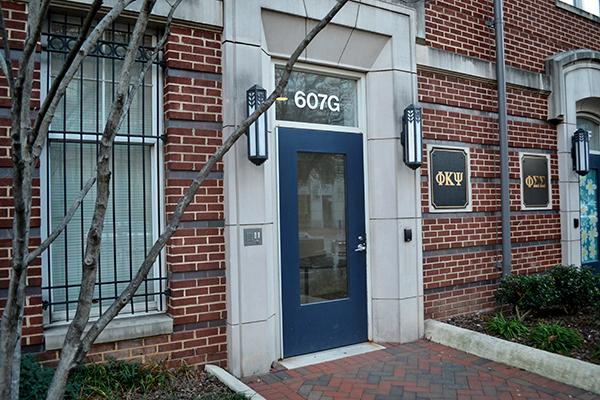The Phi Kappa Psi fraternity will return to campus this spring after a four-year suspension.
Officials kicked the chapter off campus in September 2015, citing reports of sexual misconduct, disorderly conduct, hazing and underage drinking. Colette Coleman, the associate dean of students, said any newly established fraternity typically comes to campus on a one-year probation period under IFC’s expansion policy.
“Expansion provides students more choices and brings new energy, motivation and direction to the fraternity and sorority community overall,” she said in an email.
Coleman said the University works with chapters’ national organizations and the Interfraternity Council to decide whether to bring a new chapter to campus or a previously existing chapter back to campus. She said the group decides based on a series of written and in-person presentations that outline information about the chapter that wishes to return or form for the first time.
Representatives from Phi Kappa Psi’s national organization will work with GW’s fraternity and sorority life staff to lead an informal recruitment process in late February, after IFC’s formal recruitment, Coleman said.
“We look forward to working closely with the Phi Kappa Psi organization and all of the new members to ensure a successful return to campus,” Coleman said.
Phi Kappa Psi’s national headquarters launched an investigation in November 2015 into the chapter’s conduct after officials found cocaine residue, a stun gun, marijuana, drug paraphernalia and alcohol during an administrative search of the fraternity’s townhouse. Officials terminated the fraternity’s lease on its 23rd Street townhouse in December 2015 and suspended the chapter from campus in 2016.
James D’Imperio, the senior director of chapter operations for Phi Kappa Psi, said officials from the chapter’s national headquarters worked with GW to establish a timeline for its return after the fraternity was originally suspended in 2016.
He said the national headquarter’s goal is for the chapter to earn its charter within two years of coming back to campus, and officials agreed to allow the chapter to begin its re-establishment process in spring 2020.
“This is a typical agreement that we come to in these situations, as it allows the members of the previously established chapter to graduate and move on from the university and for our organization to start fresh with an agreed upon vision between the university and the fraternity,” D’Imperio said in an email.
He said Phi Kappa Psi headquarters set “very clear standards” – like GPA, “service initiative,” leadership experience and involvement in other student organizations on campus – for potential new members to be eligible to join.
“We strive to create an inclusive, diverse chapter that can be an asset to GW Greek life as well as the community around them,” D’Imperio said.
Seamus Cullen, the president of the Interfraternity Council, did not return requests for comment.
Greek life experts said universities and fraternity national headquarters generally set requirements, like engaging in Title IX training, that chapters must meet prior to being reinstated on campus.
John LeJay, a coordinator for fraternity and sorority life at California State University Northridge, said officials usually examine whether the chapter has fulfilled conditions to return to campus before deciding to end a fraternity’s suspension. He said sanctions levied against chapters usually include fulfilling requirements like Title IX training.
LeJay said officials and Interfraternity Council leadership should emphasize educating members about sexual assault prevention and instituting anti-hazing protocols to ensure proper risk management is taking place.
“It’s always going to be continual education, education, education, whether that be workshops, developing a healthy relationship with our Title IX office or being aware of local and national guidelines and policies,” LeJay said.
IFC members instituted risk management roundtable discussions in 2019 to discuss how to mitigate risks like sexual assault and improve mental health awareness.
Jason Bergeron, the director of the center for fraternity and sorority life at the University of Houston, said fraternities returning to campus following a suspension usually meet with officials from the chapter’s national headquarters to “set expectations” for the fraternity.
Bergeron said fraternity members should regularly educate themselves about their chapter’s “checkered” history to prevent instances of misconduct.
“If the group has had any sort of problematic history or has maybe de-aligned itself with the values of the organization or the values of the university, I think there certainly is a level of ownership and making sure that men and women and the organization are educated about that history,” Bergeron said.
Jordan King, the associate director of student involvement at Elon University, said universities must tailor the process of bringing a fraternity back to campus depending on the specific reason or reasons why a chapter was removed in the first place.
“Each process to reestablish an organization must account for the particular reason for the previous chapter’s suspension, policies related to student organizations on that particular campus, fraternity and sorority expansion/extension processes on that campus and the inter/national organization’s policies related to expansion,” King said in an email.
Lia DeGroot contributed reporting.




